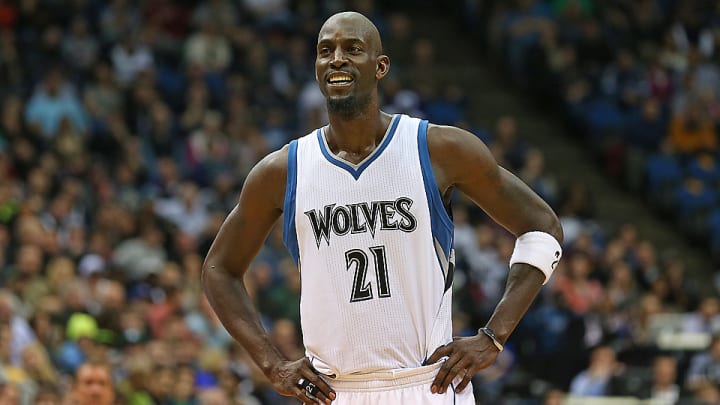Grade the deal: Timberwolves re-sign Kevin Garnett to 2-year contract

In less than a year, Timberwolves president Flip Saunders turned a valuable first-round pick into a somewhat valuable player, and then into an inactive list regular, and now into the NBA's most expensive de facto assistant coach.
Kevin Garnett has agreed to sign a two-year, $16 million contract with Minnesota, according to the Associated Press. The contract is reportedly guaranteed for both seasons and adds to his record career earnings, which already topped more than $327 million entering this off-season.
This is a move rooted in the past and future, rather than the present, for the Timberwolves. Garnett, 39, is a franchise icon, having spent 12 seasons in Minnesota before moving on to Boston, where he won the only title of his career, and Brooklyn. Saunders reacquired Garnett from the Nets last season in exchange for Thaddeus Young, hyping the future Hall of Famer as a key veteran presence during the awful Timberwolves' long-term rebuilding effort. That trade followed a previous trade in which Saunders acquired Young from the Sixers in exchange for a first-round pick.
• MORE NBA: Deal grades | Free agent tracker
After the trade, Garnett appeared in just five games for the Timberwolves, who went 16-66 and won the rights to the first pick in the draft, which they used to select Kentucky's Karl-Anthony Towns. Garnett averaged 6.9 points and 6.6 rebounds in 47 appearances for Brooklyn and Minnesota last season, and he's years removed from being a reliable night-to-night contributor.
From a basketball standpoint, there's no good reason to pay Garnett much more than the minimum at this point. Although he's still a plus defender and a fairly productive rebounder, his athleticism has slipped considerably, he's no longer an effective scoring option, and he's logged under 2,000 minutes combined over the last two seasons. Garnett, who entered the NBA as a teenager straight out of high school, has simply hit the wall, and no amount of hopeful nostalgia can undo that collision.
Grade the deal: Mavericks go big with max contract for Wesley Matthews
What's more, Minnesota—like any bottom-feeder—is best served by not giving a single minute to any player over 33. That's especially true with the many developing frontcourt pieces that Saunders has on hand: Towns, Gorgui Dieng (25-year-old first-round pick), Adreian Payne (24-year-old first-round pick), Anthony Bennett (22-year-old lottery pick) and Nemanja Bjelica (set to be an NBA rookie at 27) should all be higher priorities than Garnett when it comes to playing time. The lumps are coming one way or another.
So if he's not going to play much, and he really shouldn't play at all, what's the point here? Besides selling a good number of No. 21 jerseys, Minnesota is hoping that Garnett will be able to mentor its younger players and set a quality tone for a franchise that hasn't made the playoffs since 2004.
That's a fair goal, especially when it comes to Towns, who looks like a franchise player in the making. Although he isn't as wiry or fleet of foot as Garnett, Towns boasts a versatile inside/outside game and he projects as a quality interior defender, much like his new teammate. There's definitely wisdom to be passed down from student to teacher, and the mental challenge of interacting with the intense Garnett will make for a good introduction to the NBA for Towns.
• GOLLIVER: James keeps upper hand by inking one-year deal with Cavs
But this budding relationship isn't so important that it demands multiple guaranteed years or a salary that's significantly above the mid-level exception. Minnesota's also in a weird position to be handing out large deals. Saunders has to completely overhaul his roster, so higher-priced veterans like Nikola Pekovic and Kevin Martin are still occupying cap space. Now, he's added another overpaid, depreciating asset that he won't be able to (or want to) trade.
This summer was the time for the Timberwolves' finances to get less complicated, not messier. If overpaying Garnett to have him around was deemed to be a necessity, why not shift him into a coaching, management or player development role so that he wouldn't eat up a roster spot and count against the cap? Why not explore other options? How many hours of private tutoring from Hakeem Olajuwon would $16 million get you?
If Towns weren't on the roster, this sentimental signing would be indefensible. As is, it still looks like a questionable decision made with the heart rather than the head.
Grade: D

Ben Golliver is a staff writer for SI.com and has covered the NBA for various outlets since 2007. The native Oregonian and Johns Hopkins University graduate currently resides in Los Angeles.